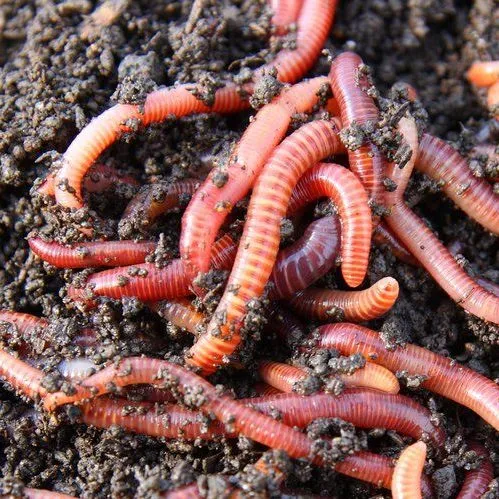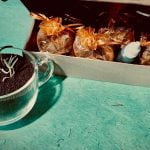Description
Earthworms, specifically the species Eisenia fetida, commonly known as Red Wigglers or Redworms, are small and highly beneficial organisms found in the soil. These worms belong to the family Lumbricidae and are often used in vermicomposting systems due to their ability to break down organic matter and produce nutrient-rich castings (worm poop).
Appearance: Red Wigglers are typically reddish-brown in colour and have a cylindrical, segmented body. They are relatively small, measuring about 5 to 10 cm in length.
Habitat: These worms are usually found in compost piles, organic-rich soil, and decaying vegetation, as they feed on decomposing matter.
Feeding habits: Red Wigglers are detritivores, meaning they primarily consume decaying organic material like kitchen scraps, vegetable peels, coffee grounds, and other organic waste. Their diet consists mainly of plant matter.
Reproduction: Earthworms are hermaphrodites, meaning they have both male and female reproductive organs. However, they still require another worm to reproduce.
Vermicomposting: Red Wigglers are favoured for vermicomposting due to their efficient consumption of organic waste and their ability to produce nutrient-rich castings. Vermicomposting is the process of using worms to break down organic matter into nutrient-dense compost, known as worm castings or vermicompost, which can be used as a natural fertilizer for plants.
Benefits for the environment: Red Wigglers play a crucial role in enhancing soil health and fertility by improving its structure, increasing nutrient availability, and aiding in the decomposition of organic matter. They also help to aerate the soil, which promotes better root growth for plants.
Sustainability: Utilising Red Wigglers in vermicomposting provides a sustainable and eco-friendly waste management solution by reducing organic waste sent to landfills and producing valuable compost that enriches the soil.
THE BENEFITS OF USING WORM COMPOST IN YOUR GARDEN
Vermicomposting, the process of using worms to break down organic matter into nutrient-rich compost, offers numerous benefits for gardens.
Nutrient-Rich Compost: Vermicompost, also known as worm castings, is a highly fertile and nutrient-dense organic fertilizer. It contains essential plant nutrients like nitrogen, phosphorus, potassium, calcium, and magnesium, as well as beneficial microorganisms that improve soil health.
Improved Soil Structure: Vermicompost helps improve soil structure by enhancing its ability to retain moisture and nutrients. The compost’s granular nature creates air pockets in the soil, improving aeration and root growth.
Enhanced Plant Growth: The nutrients in vermicompost are released slowly and steadily, providing a consistent supply of nourishment to plants. This results in healthier, more robust growth, increased flowering, and better fruit and vegetable yields.
Increased Soil Microbial Activity: Vermicompost introduces beneficial microbes and microorganisms into the soil, fostering a healthy microbial ecosystem. These microorganisms contribute to the decomposition of organic matter, making more nutrients available to plants.
Reduced Need for Chemical Fertilisers: By using vermicompost, gardeners can reduce their reliance on synthetic fertilisers, which can be harmful to the environment when overused. Vermicomposting offers a natural and sustainable alternative.
pH Balancing: Vermicompost has a nearly neutral pH, making it suitable for a wide range of plants. It helps to buffer the soil, preventing drastic changes in pH levels that can negatively affect plant growth.
Weed and Pest Suppression: Some studies suggest that vermicompost may have natural herbicidal and pest-repellent properties, reducing weed growth and deterring certain garden pests.
Eco-Friendly Waste Management: Vermicomposting helps divert organic waste from landfills, reducing the production of harmful greenhouse gases like methane. It contributes to more sustainable waste management practices.
Non-Toxic and Safe: Vermicompost is entirely safe for plants, humans, and animals, making it an eco-friendly and non-toxic option for garden fertilisation.
Educational and Engaging: Vermicomposting can be an educational and engaging activity for both adults and children. It provides insights into the natural processes of decomposition, recycling, and the importance of soil health.



